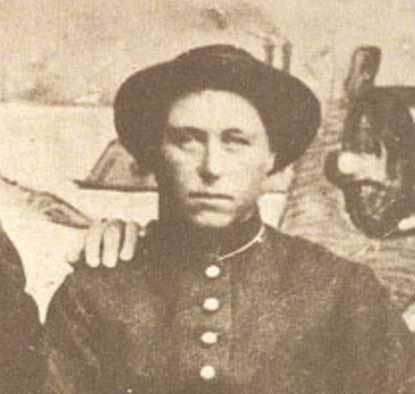Albert Cashier was a member of
the 95th Illinois Infantry during the Civil War. He was present
at many battles and marched thousands of miles with his comrades during his
three years of service in the Union Army. He was known his bravery,
despite being the smallest soldier in Company G. In fact, he was
the shortest soldier in the entire regiment. However, Albert Cashier had a
secret–a big secret. Albert Cashier was actually Jennie Hodgers. Yes, this
brave soldier of the Union Army was born a woman.
Not much is known about Albert
Cashier’s early life. We do know that ‘Jennie Hodgers’ was born in Ireland. She
immigrated to the United States from Clogherhead. She was five feet
tall and illiterate. There weren't many jobs she qualified for,
unless she wanted to be a laundress or something of the sort. This is probably
one of the reasons that Jennie Hodgers decided to dress herself as a man and
join the Union Army.
During the Civil War, physical examinations
for soldiers were perfunctory, at best. In fact, Albert Cashier was nowhere
near the only soldier who was a woman masquerading as a man. However, he was
one of the very few, that we know of, who wasn’t discovered while in service. A
great sense of patriotism must have driven these women, as well as the promise
of regular wages. The battlefields of the Civil War were notoriously savage. It
had to have taken a very brave soldier to enter the battlefields voluntarily, regardless of whether that soldier was male or female.
During the war, Albert Cashier
was present at the Siege of Vicksburg, the surrender of Mobile, the Red River campaign and Guntown, Mississippi. His comrades later
told stories of his bravery on the battlefield. However, they also told stories
about his private nature. It would seem, and this makes perfect sense, that
Albert didn’t like to be alone with the other men very often. He didn’t share
bunks with his comrades the way the others sometimes would. It was the only
indication any of them ever had that he was a woman, though they never
suspected.
Albert Cashier was discharged
from the Union Army in 1865. After the war, Jennie Hodgers did not want to give
up her newfound freedom as a man, so she continued to masquerade as Albert
Cashier. With this identity, she could earn better wages and keep in touch with
her war buddies. She even voted. Albert Cashier eventually moved to Sauremin,
Illinois, where he picked up odd jobs and lived in a modest home.
Albert Cashier kept his secret
for the next nearly fifty years. He would have kept it longer, but he was
involved in an accident that occurred while he was working on his boss’ car.
The injuries he sustained were crippling and when a doctor looked at him, the
ruse was up. Despite his deceit, he was allowed to live at the Illinois
Soldiers and Sailors Home for three years. However, his mental and physical
health continued to decline and so he was sent to a state hospital in 1914.
While in the state hospital,
workers forced Albert Cashier to wear skirts. This was very uncomfortable for
him, obviously. However, he didn’t have to suffer for long. Albert
Cashier died at the state hospital in October of 1915. Jennie Hodgers’ true identity
is carved on her gravestone, which reads ‘Albert D.J. Cashier, Co. G, 95 Ill.
Inf.’
Sources
Davis, Rodney O., Private Albert
Cashier, retrieved 1/7/10, dig.lib.niu.edu/ISHS/shs-198summer10.pdf
Paul, Linda, In Civil War, Woman
Fought Like a Man For Freedom, retrieved 1/7/10,
npr.org.templates/story/story.php?storyId=104452266
